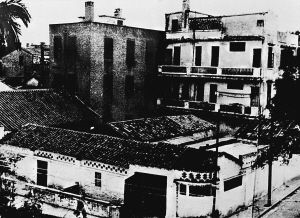
The 3rd National Congress of the Communist Party of China (中国共产党第三次全国代表大会) was held in Guangzhou from June 12 to 20, 1923. Nearly 40 representatives from all over China and Moscow attended representing 420 party members. Notable members that attended the meeting included Chen Duxiu, Li Dazhao, Mao Zedong, Cai Hesen, Chen Tanqiu, Yun Daiying, Qu Qiubai, Zhang Guotao, Li Lisan, and Xiang Ying.[1]
Main Agenda
The congress had 3 items in its main agenda: first, to discuss the draft party program; second, to discuss the establishment of a revolutionary united front with the Kuomintang; third, to elect the party's Central Executive Committee. [1]
Kuomintang Cooperation
The central topic of the congress was to discuss cooperation with the Kuomintang and establish a revolutionary united front. A report was made by Chen Duxiu that focused on the process of the party's decision to establish a revolutionary united front with the Kuomintang. After Chen Duxiu's report and discussion, the congress accepted the Communist International's instructions on the cooperation between the Communist Party of China and the Chinese Kuomintang, and passed documents such as the "Resolution on the National Movement and the Kuomintang Issue", "The Third National Congress of the Communist Party of China" and other documents. These documents focused on the idea that at the current stage, the Party "should focus on the work of the National Revolutionary Movement" and that Communist Party members join the KMT as individuals and adopt the form of intra-Party cooperation to establish a united front with the KMT in order to complete the anti-imperialist and anti-feudal campaign.[1]
Election Results
The conference elected Chen Duxiu, Cai Hesen, Li Dazhao, Tan Pingshan, Wang Hebo, Mao Zedong, Zhu Shaolian, Xiang Ying, and Luo Zhanglong as members of the Central Committee, and Deng Pei, Zhang Lianguang, Xu Meikun, Li Hanjun, and Deng Zhongxia as alternate members of the Central Committee. Luo Zhanglong and Tan Pingshan (later changed to Wang Hebo due to Tan's transfer) formed the Central Bureau with Chen Duxiu as the chairman, Mao Zedong as the secretary, and Luo Zhanglong as the accountant, responsible for the daily work of the central government.[1]
Outcome
After the three major congresses of the party, Sun Yat-sen reorganized the Kuomintang under the impetus of the Communist Party of China, determined the three major policies of uniting Russia, uniting the Communist Party, and supporting farmers and workers. Once the cooperation between the Kuomintang and the Communist Party was formally established, a massive and vigorous anti-imperialist and anti-feudal revolutionary mass movement was launched across the country, and the Northern Expedition was successfully launched, which promoted the upsurge of the Chinese revolution. However, the congress did not give due attention to the question of the leadership of the proletariat, the peasantry and the army.
On the day when the party's three major congresses ended, delegates came to the Huanghuagang martyr's tomb and sang the Internationale under the command of Comrade Qu Qiubai. The Third Congress of the Communist Party of China successfully concluded amidst the majestic and powerful international singing.[1]